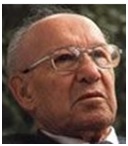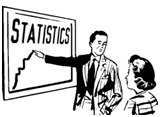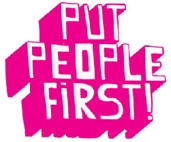|
 |
|
 |
|
|
||
Peter Drucker, Management: Tasks, Responsibilities, Practices (1973) Drucker (a German- born American) is the father of modern management (pictured right). He has written many outstanding books, but The Practice of Management and this book are his most influential. More than any other books they brought to people’s attention the importance of management. He once said that his life’s work centred on balancing continuity and change in organizations He died in 2005.
See also... Peter Drucker in the Management Gurus section.
Book summary
What is management?
“Management is a practice rather than a science” based on:
a) people Management is what managers do (see below), particularly getting results through people. So management success is dependent on the: “vision, dedication and integrity of managers” .
b) responsibilities Managers must have responsibilities to:
c) tasks and practices See below.
Tasks and practices of effective managers
1. Define the organization’s purpose This should be related to maximizing productivity (the most effective use of resources like people, time and money) in a business’s two basic functions: a) marketing (customer creation) An organization’s purpose is “to create a customer” and management must create an organization-wide commitment to achieving it.
b) innovation Finding new and better ways of creating customers - for example:
Profit is the result (not the cause) of these two functions. So profit is a barometer of success, not an objective.
2. Customer driven planning and strategy “Strategic planning prepares today’s business for the future”. So successful strategy requires knowing:
Key strategic questions are:
3. Manage for the present and the future Managers must be:
So they must:
But success can easily become failure, because success:
4. Motivating people Employees must be encouraged to take responsibility for their work by making it stimulating and productive through:
Every manager must ask two questions: What do I, and the organization, do to help, or to hinder, you in your job? How can I help you do the best job for the organization? Managers’ integrity must create the “spirit of performance” based upon:
Employees, who are no longer useful, should be transferred to another job, not fired. Dismissals harm managers’ integrity, reducing their ability to motivate.
5. Managing the organization’s social responsibilities An organization is “an organ of society and exists for the sake of society”. Social responsibilities arise from:
It is managers’ responsibility to:
But there are limits on social responsibilities:
Managers should follow doctors’ Hippocratic Oath: “Above all, not knowingly to do harm”.
6. Organizing Managers must:
An organization’s structure must:
7. Controlling Management controls (like budgeting) must be:
8. Decision making Managers’ decision making must:
a) inspire effective action Inspiration comes from:
b) encourage creativity and new solutions (through constructive disagreement).
c) be made at the lowest possible level Solutions to problems must be found by the people facing them.
d) remember the consequences of doing nothing (which sometimes is the best option). e) consider anything relevant Management decisions must take into account:
f) ask four questions Who has to know of this decision? What action has to be taken? Who is to take it? Can it be implemented? 9. Developing people Managers must enable people (including themselves) to learn and improve through, for example:
Key quote on management The ultimate test of management is performance (there is the same quote referring to “business performance” in Drucker’s book, The Practice of Management).
Key quotes on organizational objectives The question: ‘what is our business?’ can, therefore, be answered only by looking at the business from the outside, from the point of view of the customer and the market. The purpose of an organization is to enable ordinary human beings to do extraordinary things.
Key quote on business success and production Efficiency is concerned with doing things right. Effectiveness is doing the right things.
Key quotes on marketing The aim of marketing is to make selling superfluous. The aim of marketing is to know and understand the customer so well that the product or service fits her and sells itself. Marketing should result in a customer who is ready to buy.
Key quote on decision making The effective decision maker...organizes dissent.
Key quotes on strategy The aim of strategic planning is action now. Long range planning should prevent managers from...dedicating their resources and energies to the defence of yesterday.
Key quote on finance and management Controls follow strategy. |
|
|
||
|
|
||
| Copyright © wisdomtowin.com 2025 All Rights Reserved | ||
|

















